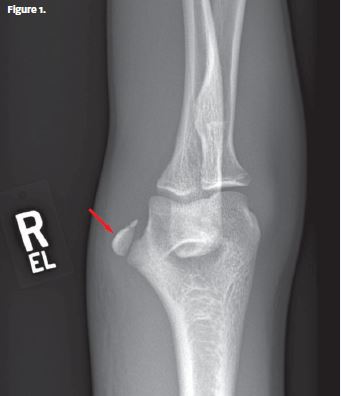Published on
Differential Diagnosis
- Displaced avulsion fracture, medial epicondyle
- Medial epicondylitis (golfer’s elbow)
- Apophysitis of the medial epicondyle (little league elbow)
- Supracondylar fracture
- Normal apophysis

Diagnosis
The correct diagnosis is a significantly displaced avulsion fracture of the medial epicondyle. Note on the lateral x-ray, there is a joint effusion. On the AP x-ray, there is a large fragment avulsed from the medial epicondyle with associated soft tissue swelling.
Learnings/What to Look for
- Medial epicondyle avulsion is typically seen in adolescent throwers
- In contradistinction to the repetitive trauma resulting in apophysitis (little league elbow), this fracture usually results from a single high-force valgus trauma and athletes often hear a “pop”
- It is important to distinguish an avulsion fracture from a widened (apophysitis) or normal growth plate
Pearls for Urgent Care Management
- Medial epicondyle fractures are best immobilized with a posterior long arm splint and arm sling
- Surgical fixation is required for injuries with complete neurologic deficit, incarcerated fragments, open wounds, or significant displacement
- Orthopedic follow-up is always necessary within 7 days. Possible surgical cases should be referred for same- or next-day evaluations
- Surgical reduction is often preferred for mild-moderate displacement in overhead adolescent athletes (swimmers, pitchers) or weightbearing athletes (gymnasts) who will continue to have valgus instability if the fragments is not stabilized
Acknowledgment: X-rays and case presented by Experity Teleradiology (www.experityhealth.com/teleradiology).
A 15-Year-Old Boy with a Painful Elbow After a Baseball Game
1 2
